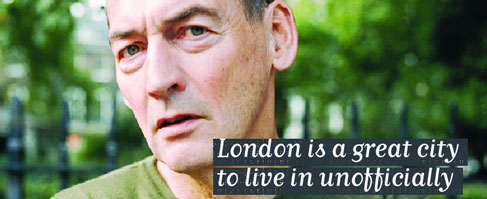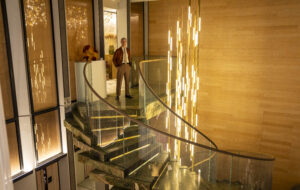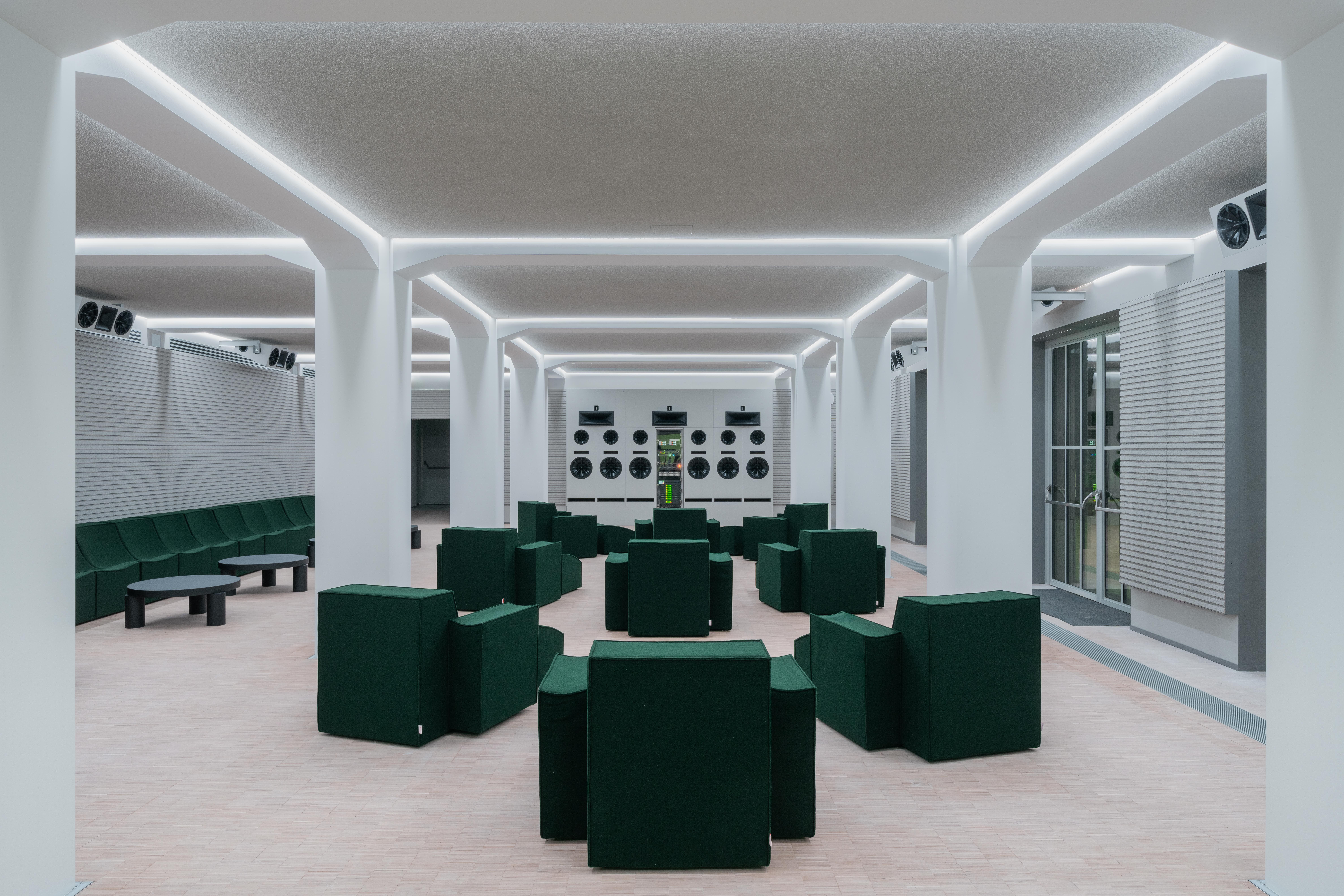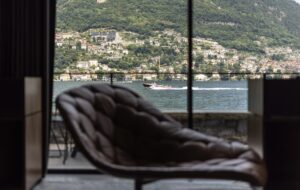
Rem Koolhaas I mean so many people live here that you don’t know live here. I interviewed Wolfgang Tillmans here last week – he lives here. And the reason so many of us live here is because it is for all of us the most anonymous condition. I actually came here in ‘68, and have never really left. I spent eight years in New York, that was the only exception.
icon Did you come here first to study?
rk Yes, at the Architectural Association. I was 25 at the time. I supported myself by scriptwriting and journalism.
icon Do you keep your life here separate from your life in practice in Rotterdam?
rk I try to, yes. I have a family here. But that also means that I have a really incredible overview of how London has transformed from being really exotic in its grimness. When I first came to the AA, they had set tables and waitresses with little aprons and fireplaces that worked. It was unimaginably English. And now almost 40
years later, it’s totally international, totally un-English.
icon And does this transformation apply to the city more broadly?
rk Of course, the whole city has transformed. It’s strange because my enthusiasm for the city took a very long time to ignite.
icon When did you get to like London, then?
rk Actually, relatively recently. It’s only in the last ten years that I’m really able to enjoy it, to understand it and how it works, to understand what all the different components are.
icon What was the problem?
rk What I didn’t really understand is that after seeing one city after another go really touristic or global, or be more and more affected by and held back by its identity, I think that the incredibly great thing about London is its resistance to a single interpretation or a single identity. Basically, it’s resistance. And I think that what has also impressed me more and more is that it really is a city that enables so many people not only to live together, but to live in a kind of mutual engagement and a real interpenetration rather than that token co-existence that you see elsewhere.
icon Can you give an example of that?
rk My children have friends of maybe 20 different nationalities, and at some point they had only one English friend. But then those nationalities were never pure, but were always a combination of Irish and Sri Lankan and so that shows a real engagement rather than a token but separate organisation.
icon OMA started in London in 1975. How much did you associate OMA with London at that time?
rk Of course the AA is a kind of deeply influencing school for good reasons and bad – it leaves marks. But being here was an absolutely crucial part of what in the end developed as my agenda and it’s unthinkable that it would have happened in a similar way without the AA. And of course the thing that first made us known was a project on London called Exodus.
Basically at the time we thought that London was really underdeveloped and not particularly metropolitan. That’s why I’m saying it took me a long time to really understand the city. So we made it metropolitan. And now I realise that it is metropolitan in it’s shapelessness and extensiveness.
The first really forceful city issue I tried to deal with was New York [Koolhaas’ Delirious New York was published in 1978]. In retrospect, I would now say that was a very old-fashioned kind of urban condition. It took me 20 years to discover that I had really started in a more relevant and more contemporary environment.
icon What is it about London that is more relevant and contemporary?
rk Well, you only have to look at architecture in the past 30 years in New York and in the past 30 years in London. I know London hasn’t been overly-blessed with great architecture, but in New York it’s literally zero. And the system there is geared to ensure that it will remain zero, indefinitely. So in that sense the situation in London has always been more open and seems now to be wide open.
icon Why do you think it is so open right now?
rk I can’t quite judge it, but there are two things. I think that the English relationship with modernity has been inhibited for such a long time – in a sense it’s a curious belated flowering. It’s not entirely sophisticated, but we are definitely benefiting from that. And I think that England, through this Anglo-Saxon fluidity and the fact that the market has always been a determinant of values here, has been able to manipulate forces in a much more sophisticated manner. I mean, that’s what I can sense. So on the one hand it’s a slightly old-fashioned discovery of modernity, and on the
other hand a really refined sense of what the market can do.
If you look at many of the current urban projects in London, they all try to create uniqueness out of the same ingredients. They all have canals, they all have boulevards or public streets, and to some extent that’s inevitable, the generic vocabulary that commercial development brings.
The beauty of the White City site [which OMA is masterplanning] is that it’s one of the few rectangular and free areas in the whole of the city, so that has enabled us to create something which is genuinely permeable for the city and that somehow doesn’t have to be so artificial about creating identity. What is exciting, for instance, is that our developer has not chosen a grand aristocratic name: it’s called West 12. Which is basically the zip code. I really like that idea.
icon There has been a lack of grandeur to urban plans in London. What do you feel London is encouraging now in its urban projects?
rk The situation is really wide open, because the GLA and [London mayor] Ken Livingstone – through his adviser Ricky Burdett – are encouraging people to get rid of any a priori ideas, even in terms of scale. It’s not that they’re encouraging us to be insensitive, but Livingstone said to me “we want the maximum”. So there’s maximalism in the air. Which theoretically would enable you to make interesting urban projects.
icon Why has it taken you so long to work here?
rk I tried the Tate of course. We have tried intermittently, but I think even at the Tate moment the idea that we would win was almost unthinkable. And also I really wanted to protect my privacy and not work here.
icon Is London on the edge of an extreme moment of urban change?
rk It’s a kind of ambiguous situation, because yes that is true, but it will probably also remain more the same, more itself than any other city in the world. And that is connected to the vastness of the city, which somehow, for the foreseeable future, seems to create an almost infinite reservoir for discovering different areas and realising their potential without tampering with its kind of gestalt, you can say. And that is what I really like. There is no way you can dominate it with a single building.
icon Tell me about your personal relationship with the city.
rk The personal connection with it is really physical, in the sense that there are certain trajectories, where I really know every square inch or pools where I swim you can make incredible connections to random Londoners and to random sections of Londoners. For instance on Hampstead Heath there’s a running track, I don’t know whether you have been there. But it’s so deeply dirty and unfashionable and decaying. And weird. So that has given me so much pleasure simply to be able to participate in these completely unchanged conditions. There’s even a swimming pool that is open in the winter. It’s worth seeing because it’s so eccentric, it’s so deeply crazy, and over the years I have seen the people who swim there change from all white to more mixed racially. Every year there was a new pixelisation. It has been really fantastic to have those totally unimportant but private experiences in the city.
icon Does this hidden network of people in London inspire you to work or is it a leisure thing?
rk It’s more leisure time. London has basically everything you need for your brain that is neither sleep nor work. I have seen it also from being a place with a deeply inaccessible culture to becoming a place – through the Tate etc – of accessible culture. Of course I enjoy it, but that isn’t the critical feature that excites me.
icon Do you think globalised events like the Olympics will have an effect?
rk Yeah, of course. But I’m very bad at predicting the future. The Olympic games are always exciting and then anti-climactic the day after. But I think London will be immune to that. Because on the one hand it will not make it so important, so exciting, and on the other hand it will not be so disappointed afterwards. There is an in-built English mentality, that is miraculously shared by anyone who lives here that is a kind of resistance to excess. I hate the word, but level-headedness turns out to be a really important feature.
















